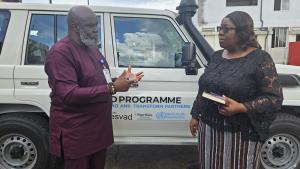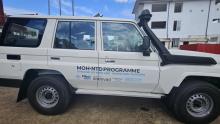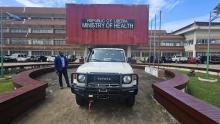WHO and partners boost Liberia’s fight against NTDs with vehicle donation
Monrovia, Liberia – To strengthen Liberia's fight against neglected tropical diseases (NTDs), WHO handed over a brand-new Toyota Land Cruiser (Hardtop) to the Ministry of Health. Funded through the Transform Partnership comprising Effect Hope, Anesvad Foundation and Hope Rises International, the vehicle will support integrated outreach, monitoring, and community engagement in some of Liberia’s most inaccessible areas.
Liberia is endemic for several priority NTDs, including lymphatic filariasis (LF), leprosy, Buruli ulcer, onchocerciasis, schistosomiasis, and soil-transmitted helminthiasis (STH). The country has made significant progress in controlling these diseases, mainly through preventive measures.
“On behalf of the WHO Director-General, the Regional Director, and the management of the Transform Partnership, I am honored to present this vehicle to the Ministry of Health to support the national NTD program,” said Dr. Olushayo Olu, WHO Country Representative a.i. “This donation reflects the strong partnership between WHO and the Transform Partnership and demonstrates our joint commitment to eliminating NTDs in Liberia.”
Receiving the vehicle on behalf of the Minister of Health, Dr. Catherine Cooper, Deputy Minister for Health Services and Chief Medical Officer of Liberia, expressed deep appreciation for the support. “NTDs affect all regions of Liberia,” Dr. Cooper noted. “This vehicle will greatly enhance our capacity to reach remote communities, identify cases, and deliver life-saving medicines. It will accelerate our efforts toward achieving the elimination of NTDs.”
This milestone comes on the heels of two major nationwide Mass Drug Administration (MDA) campaigns and the expansion of services for the case management of Skin NTDs across Liberia. Since November 2024, over 2 million Liberians have received preventive treatment for diseases such as lymphatic filariasis, onchocerciasis, schistosomiasis, and soil-transmitted helminths. These efforts are aligned with Liberia’s 2023–2027 National NTD Master Plan and the WHO’s global roadmap to end NTDs by 2030.
Despite progress, challenges like global funding cuts and difficult terrain still exist. However, with ongoing commitment from partners, increasing domestic leadership, and community involvement, Liberia is improving its program delivery and moving toward a future free of NTDs.



